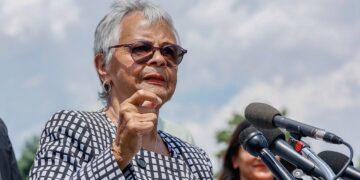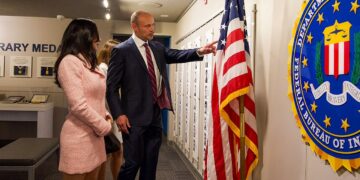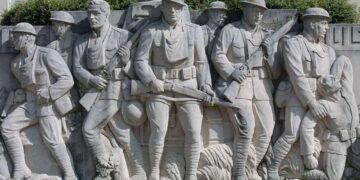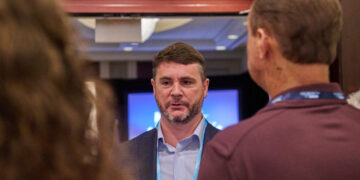Society to learn more about this who speak with Adrian Norman he’s an author News writer and political commentator he’s also a member of the black leadership Network project 21 an initiative of the national Center for Public Policy research that seeks to promote the views of African Americans whose entrepreneurial Spirit dedicated
To family and commitment to individual responsibility have not traditionally been echoed by the nation’s civil rights establishment Adrian shares his take on the violence stem from the hip-hop music industry that is the topic of his new documentary smoke and mirrors Adrian has attempted to shed light on an issue that
Unfortunately only becomes mainstream newsworthy after the killing of aspiring rappers we speak with Adrian about some of the main narratives in African-American communities in the United States the impacts of progressive policies and how the nation can move forward hey Adrian Norman thanks for being here hey thanks for having me Josh I
Appreciate it and always a pleasure to say you know you put together a pretty interesting documentary it’s called smoke and mirrors and you know you’re raising one of the bigger issues that people look at when they talk about black lives matter which is violence in Black communities
And I I think your documentary is really interesting because you touch on things I’ve never heard anybody touch on and I get I guess just introducing this could you tell us kind of why you wanted to do this documentary why focus on black on black crime and especially focusing on
Among the rap community in particular sure absolutely so I’m glad to hear you say that we’re touching on some things that you haven’t really heard discussed before um the impedance for this project was the the death of takeoff a few months ago he was a a rapper in the group Migos
And it was just the latest in a string of killings of hip-hop artists over the years so after that death lots of questions were raised and of course lots of conversations began about once again violence within black communities violence within hip-hop and people sort of exploring ways to figure out how to
Address those issues um a lot of times we get into this in the video these conversations happen and then a few months later you know things kind of go by and we forget about those conversations and and everybody just kind of moves on and it just keeps
Happening over and over again so this project was designed to sort of keep a spotlight on it and try to shine a light on this issue and try to assess why this keeps happening and what is going on in these communities to where this is a regular occurrence because this doesn’t
Seem to happen to artists in any other genre because this doesn’t happen in the house music producer this isn’t happening in the rock stars this seems to be an exclusively by and large black music phenomenon so um I will push back a little bit initially and say it’s not a project
About black on black crime black on black crime really isn’t a thing people victimize who they’re closest to blacks victimized blacks at the exact same rate that Whites victimizes Whites so if we’re going to say black on black we need to have conversations about white and white crime overall crime is just
Crime you you victimize who’s closest to you um but we put together a panel of uh people who frankly are a lot smarter than me and we uh took a look at this and conducted a series well I had an interview with each of them that ran a very long time
Um so we got into a couple of overlapping themes um in addressing this issue we focused on families we had conversations about political political choices and Progressive policies that have impacted these communities and brought them to the destabilized positions that they’re in we get into how neighborhoods have been destroyed
Um the actual music and is it is it uh art imitating life or life imitating art and then we also got into some Solutions on how to actually resolve this issue so I think it’s a productive piece it runs about 80 minutes I hope people tune in because again it’s bringing together
People who don’t necessarily dis or don’t necessarily agree on every single point just like in real life but there are a lot of stakeholders on this issue we’re all impacted in some way when there’s violence in any Community whether we we want to admit it or not so
Um it’s a pretty broad pretty broad conversation that we have we cover a lot of areas and I think if we if you make it to the end you’re gonna you’re gonna see ways that individuals can start to make a difference in their own community
And we can start to to tap this issue and end some of this violence that’s plaguing communities throughout the United States yeah you know speaking of the race race issue there’s something really important that you brought up in this documentary kind of more towards the beginning
Um which is that it kind of raises the question of are we having the right conversations uh you know we tend to view this as a black issue and not as an American well it’s I think more towards the middle you got to this but we’re not
Viewing this as an American issue and this really brought up some of the questions some of the discussions I see people having especially among conservatives where you have a lot of these anti-white narratives White America you know white people responsible for this and that but it
Goes both ways a lot of different ways actually where people tend to view problems in the black community as problems with the black community and they don’t view it as an American problem what you know why did you choose to bring up that discussion because I actually I I actually really agree with
You on that we need to start viewing things not as one group or another but as problems for us as a nation yeah that came up with a conversation on family structures in the nuclear family conservatives a lot of times like to focus on fatherless homes and you know
We often use this Trope you know uh 70 of black kids are fatherless which is factually untrue I mean data’s been out on that since 2013 the CDC releases information on it which we get into in the video um but uh Rachel was making that point
In uh saying that when it comes to the issue of of fatherlessness that number is closer than 50 percent but it’s not that it’s just an exclusively black phenomenon it also impacts Hispanics it also unpacks whites it’s just that blacks get hit first and then everybody else gets hit later so it’s very
Limiting and reductive and unproductive to have a conversation that’s that’s focused on such a statistical falsehood and make it seem like just a black problem when really it is an American problem um and I think that again with this conversation we can kind of uh open up
Open up dialogue a little bit more and have sort of a broader conversation on all of these things but yeah we have to start viewing these issues as not exclusive to just one community and realize that all of these problems impact the entire country if if uh
There’s part of your city that is violent or experiences violence if someone loses A Life That’s one more Creator we don’t have that’s one more potential scientist that we don’t have that’s a potential astronaut or doctor that we don’t have participating in society to to help move us forward and
To solve challenges and to make the world a better place so ultimately all of this is everyone’s problem and again one of the goals of this project was to try to have a more productive conversation and iron out and hash out the facts about how we got here in the
First place and also the solutions we can’t those two things aren’t separate you know we can’t talk about where to go if we don’t know where we’ve been so we get into some of the history of what’s happened to these communities with uh with policies that have destroyed them
Things that have led us to the point that we have some of the disparities that we have and then also ways that we can move forward yeah and you alsoever actually towards the beginning I think you did mention this part which is you know like 80 of Black America this
This does not really apply to and we tend to group I mean look at the left does it a lot the right does it too we tend to group people too much and at least in my opinion and you know look you know the problems we’re seeing in inner cities and you
Know poorer communities whether it’s you know the bad parts of East New York or whether it’s like Appalachia you know white white areas um you do see these kind of same problems but that does not rep when it comes to Black Americans this does not represent the overwhelming majority of
Them you mentioned I think by like 80 percent of Black America is like middle class yeah and so for some reason we tend to view everybody is being part of it yeah and yeah but yeah it kind of addressed why you brought that up because that that’s an interesting
Discussion point I haven’t really heard anybody talk about yeah well I mean the problems that that we say are are black phenomenon are also problems that you see in white Appalachians you know it’s more of a more of an issue of Economics versus race and I think it’s very limiting to
Make every discussion about race when they’re they’re a stronger conversations that we could be having so yeah the problems that are plaguing black inner cities are also plaguing poor white areas you know a poor white person that’s more in common with a poor black person than to a rich white person so to
Focus on Races is a little idiotic at this point uh in time but there are some some things and some problems that are exclusive to the black community because we have a history of the the state imposing laws and restrictions specifically against us with the intent of disenfranchising black people and
Bringing about those disparities in the first place we get into that that history in the video um last year something came up I think with Pete bootage was talking about the the highways were racists or something like that and it was a big Trope on the
Right people made a lot of jokes about it but if you want I I always suspected man if you understand history though you understand that that that’s a real phenomenon not just that the in highways are inherently racist right but when you when you get into the history of how
Some of these Highway systems were designed you had thriving black neighborhoods metropolises and well Metropolis brought you strong for but thriving black neighborhoods and economic centers and and stable neighborhoods and stable families and they literally built these Highway systems right through them to to break them up and Destroy them we had areas
Like Black Wall Street that were big Financial Centers and there were more it was wasn’t just Black Wall Street there numerous across the entire country and the government through policy through intentional action destroyed those communities you know we had projects that were put up for low-income public
Housing we had governments that that uh the government that wouldn’t allow the federal housing Administration to lend to black people not only wouldn’t allow the banks to lend to black people who wanted to buy homes but they wouldn’t lend to white people who wanted to live next to black people
So you have this this Cascade of government policy from the East Coast all the way to California that was intentionally designed to negatively impact black Americans and that’s how these neighborhoods got destabilized in the first place
































 Reaction & Commentary
Reaction & Commentary












